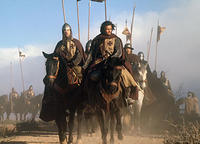Not a Deal, Only a Delay
When I first heard that a deal had been struck that would protect the filibuster, confirm a few Bush nominees, and leave others in limbo, I was deeply suspicious. Upon further thought, I have tentatively concluded (I reserve the right to completely change my mind at any time; call it the Kerry Caveat) that the deal isn't so bad after all, so long as the Republicans actually enforce it. I fully expect the Democrats--who have grown quite adept at painting any conservative judicial nominee as Attila the Hun reborn--to renege on their end of the deal by interpreting "extraordinary" to mean any judicial nominee who is to the right of Ted Kennedy. Once that happens (the pressure brought to bear on Senate Democrats by the leftwing interest groups will be immense), as I understand the arrangement, the Republicans will be justified in seeking the end of the filibuster for juidical nominees. Whether they have the will to do so has never been less clear. There is some rather artful ambiguity on this point, which was probably deliberate, given that we are talking about politicians here. As things stand now, both sides have an escape route.
In the final analysis, this deal must be judged by its effectiveness in ensuring that President Bush's Supreme Court nominees (assuming there will be vacancies this summer) will be confirmed, which is what this entire standoff has really been about anyway. If Bush nominates an even remotely conservative judge, I expect the Democrats to play their part to perfection. Reid will have an attack of the vapors, Byrd will wax eloquent on the foundations of the Roman Republic, Schumer will lament that the President has not rewarded the Democrats' good faith, and Kennedy will blather on about how this nominee is the most extreme, dangerous nominee he's ever seen, blah blah blah. Again, it will be up to the Republicans to enforce this agreement; the Democrats cannot be relied upon.
Contrary to the breathless boasts of the 14 senators who saved Western civilization as we know it, this deal does not avert the coming clash; it only postpones it.


